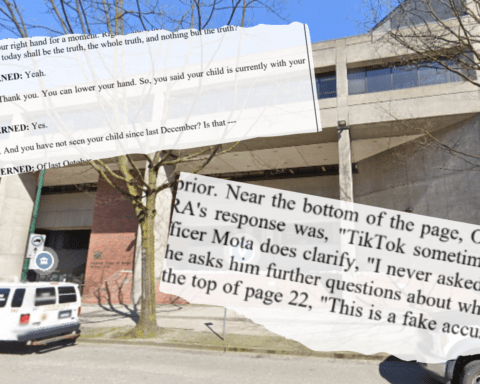A group representing immigration consultants in Canada has fired a broadside against immigration lawyers who want the former to work under the purview of the legal fraternity.
The Canadian Association of Immigration Consultants (CAPIC) argues that immigration lawyers are in direct competition with their members and have a vested interest in suggesting a relationship in which consultants are subordinate to lawyers.
“The role played by the 9,500 Regulated Canadian Immigration Consultants in Canada’s immigration industry is enshrined under federal statute and is not subject to reversal based on the opinions of a small group of lawyers,” according to Dory Jade, CAPIC’s CEO.
In a letter following last week’s NCM’s report that quoted the Canadian Immigration Lawyers Association (CILA) calling for an end to the self-regulation of immigration consultants, Jade said his industry is not subject to reversal based on “the opinions of a small group of lawyers.”
“CAPIC supports the goal of improved accountability and has worked tirelessly to establish a regulator with the powers to achieve these aims,” he says.
That regulator is the College of Immigration and Citizenship Consultants (CICC), which officially opened its doors last week.
Under the new College Act, the College has new powers and tools to investigate professional misconduct and to discipline consultants. While the government is putting $50 million generally towards anti-fraud measures for the immigration system, John Murray, the College’s CEO, says the regulator is funded entirely through its membership base.
Immigration consultants will now also need to complete a new competency-based graduate diploma in immigration and citizenship law from Queen’s University or the University of Montreal after getting a bachelor’s degree.
The diploma is not equivalent to a law degree, but Murray says graduates will learn “enough to meet the essential competencies determined by the…College.”
“Graduates (of the now required program)…focus their whole course on the requirements of the Canadian immigration system and legal aspects of that,” he says.
‘Difficult to detect’
CILA told NCM that the College will be “simply a third incarnation of two previous federal attempts (Canadian Society of Immigration Consultants and the Immigration Consultants of Canada Regulatory Council), which have failed.”
“This is nothing more than a name change, as all consultants under the previous regime will now be grand-parented into this new College and all the problems associated with the thousands of immigration consultants engaged in the actual practice of law today will continue,” said CILA steering committee member, Barbara Jo Caruso.
While consultants who are grand-parented into the College are expected to “meet the essential competencies for immigrant consultants” — that is, abide by the new rules — they are not required to also take up the graduate program.
Murray says they will instead be “assessed against the professional standards and competencies that are taught and tested in that course going forward.”
It’s not clear how many current immigration consultants have equivalent education or degrees and Murray could not estimate. But he says upgrading the profession’s “entry-level educational requirements” has been a priority, and the diploma is the “next step in that evolution.”
Murray says he doesn’t think the lack of this latest educational requirement has contributed to the level of fraud the industry is plagued with, saying “ethics” has been a “major component” of training.
Nevertheless, he admits, fraud has been “difficult to detect” in the industry. “All you can do is punish it when you find it,” he says.
Asked if this meant the only approach is a reactive one, meaning applicants will have to be defrauded before fraudsters are caught, he replied saying that’s a “gross overstatement.”
He pointed to a “three-pronged approach” that includes public education, punishment (of fraudsters) and outreaching to unlicensed consultants in other jurisdictions to try to get them licensed, “because not all unlicensed consultants are fraudsters,” he says.
“I’m not denying that there is a problem, but it’s a complex problem, and it’s further complicated by the fact that we’re in a global world. It’s very easy for someone in a foreign jurisdiction to insert themselves into the Canadian immigration equation,” he says.
He insists this makes it hard “to detect them and take action…either remedial or punitive until they’ve stuck their neck out and done something that is brought to our attention. It’s a big place.”
CILA wants a system where consultants will work under the supervision of lawyers, who will ultimately be responsible for representing immigrants and refugees in terms of their applications and when assisting them at tribunals and courts.
Jade said CAPIC’s review of the proposed Code of Conduct for members of the new College highlights his association’s commitment to improving the integrity of Canada’s immigration industry while ensuring the public has access to the essential services offered by immigration and citizenship consultants.
It’s important to note that while CAPIC represents immigration consultants’ interests, the College’s mandate is towards the public.
Jade disagrees with the notion that the new College is a third incarnation of two previous government attempts to establish a body to self-regulate immigration consultants.
“Regulatory bodies go through many iterations to meet the evolving needs of a given profession. The Law Society of Ontario went through such an evolution in 2018, changing its name and rebranding, while incorporating the regulation of paralegals under its mandate. Similarly, CICC is not a third attempt at regulating immigration and citizenship consultants…but rather the continued progression of a regulatory body offering improved oversight and disciplinary powers.”
“CICC has a small number of disciplinary cases on record because it is not a brand-new organization, but rather a continuation of the previous regulator, the Immigration Consultants of Canada Regulatory Council (ICCRC). Disciplinary cases are a common feature of regulatory bodies and highlight the importance of accountability,” said Jade in his letter.
At the time of writing, there are 60 current disciplinary cases listed on the College’s website. This is up from the 33 that were reported on Nov. 26. It should be noted that, as the website states, “in active cases, the Tribunal has not yet accepted any of the allegations listed.”
Though Murray doesn’t believe this feud has contributed to the gaps in the system that has allowed applicants to be easy prey for fraudsters and unlicensed consultants, he admits it has “clouded the issue of unlicensed immigration practitioners.”
“The vast majority of immigration…consultants or lawyers…are ethical and competent and act only in the best interest of their clients,” he says. “It’s a real shame that a few bad apples on both sides — and a few more unlicensed and unregulated individuals — have been able to lead the story.”
A multiple-award winning journalist, Fabian Dawson is an internationally acclaimed author, filmmaker and media expert. His work over the last four decades spans the globe and he also serves as a consultant/strategic advisor to a variety of international companies. As deputy editor-in-chief of The Province, part of the Postmedia chain, Dawson led initiatives within a special publications group to provide directed content for a variety of organisations. He was named the 2019 recipient of the Bruce Hutchison Lifetime Achievement Award at Jack Webster Awards. Dawson has been invited by the governments of India, Malaysia, Taiwan, China, Hong Kong and the United States to act as a media observer/advisor on a variety of Asian-Canada issues. Dawson, now operates FD Media, which specializes in harnessing editorial assets to revenue generating opportunities.
Fernando Arce is a Toronto-based independent journalist originally from Ecuador. He is a co-founder and editor of The Grind, a free local news and arts print publication, as well as an NCM-CAJ member and mentor. He writes in English and Spanish, and has reported from various locations across Canada, Ecuador and Venezuela. While his work in journalism is dedicated to democratizing information and making it accessible across the board, he spends most of his free time hiking with his three huskies: Aquiles, Picasso and Iris. He has a BA in Political Science from York University and an MA in Journalism from Western University.







This is funny actually.
Doesn’t anyone do their research when writing about this? Seriously, this is simple.
Lawyers have 2 or 3 years of law school. None of these three years deal with immigration law. At all.
RCICs have the equivalence of about 1 year post grad, with ALL focused on immigration law.
Most lawyers don’t have a clue about immigration.
The small group of nay sayers in the CBA are just angry lawyers whose own colleagues wouldn’t hire them for a basic visitor record extenstion. I’ve heard lawyers at a cafe in Toronto openly mocking this little group of ‘lawyers with no real practise just finding a way to be a lawyer.’ It is sad actually.